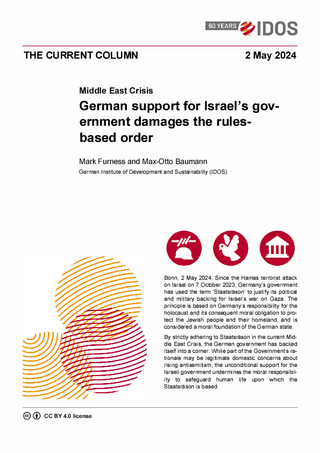Middle East Crisis
German support for Israel’s government damages the rules-based order
Furness, Mark / Max-Otto BaumannThe Current Column (2024)
Bonn: German Institute of Development and Sustainability (IDOS), The Current Column of 2 May 2024
Bonn, 2 May 2024. Since the Hamas terrorist attack on Israel on 7 October 2023, Germany’s government has used the term ‘Staatsräson’ to justify its political and military backing for Israel’s war on Gaza. The principle is based on Germany’s responsibility for the holocaust and its consequent moral obligation to protect the Jewish people and their homeland, and is considered a moral foundation of the German state.
By strictly adhering to Staatsräson in the current Middle East Crisis, the German government has backed itself into a corner. While part of the Government’s rationale may be legitimate domestic concerns about rising antisemitism, the unconditional support for the Israeli government undermines the moral responsibility to safeguard human life upon which the Staatsräson is based.
Israel has a right to defend itself. Its conduct of the war on Gaza nevertheless constitutes a breach of international law. It is hard not to read the deaths of more than 30,000 people and the forced displacement of 85% of Gaza’s population as collective punishment, which is prohibited by the Geneva Conventions. The Israeli government has argued that its scorched earth approach is justified because Hamas is hiding behind ‘human shields,’ which include the more than 130 Israeli hostages still in Hamas’ captivity. While human shields are also prohibited by the Geneva Convention, they are still entitled to protection. Israel’s evacuation order to 1.1 million Gazans, with the implication that those who remained in their homes are legitimate targets, contravenes these principles. The Israeli military’s attack on the Iranian embassy in Damascus also breached international law, specifically the Vienna Conventions on Diplomatic Relations and Consular Relations, which protect diplomats and premises. The attack was highly reckless, prompting an unprecedented Iranian drone, missile and rocket attack on Israel.
The Israeli government has justified its actions as defence against existential security threats in a violent regional context. However, the point of a rules-based order is that conflicts should be conducted in accordance with international law, because in the long-term that offers the best chance for global peace. The dangerous regional escalation emanating from the Gaza conflict appears to demonstrate that wisdom enshrined in international law. Germany and other Western governments have appealed to this logic in the Ukraine conflict, but not in the Middle East despite similarities regarding civilian casualties and risk of escalation in both cases.
Staatsräson also influenced Germany’s partial stop in funding for UNWRA. The fundamental necessity to support the only body that can provide humanitarian aid at scale, in the context of a worsening hunger crisis in Gaza, has been overridden by Israel’s allegations that UNRWA staff were involved in the 7 October terror attack. Germany, along with other Western governments, ignored the UN Secretary General’s urgent appeals to maintain UNRWA’s capacity to relieve suffering in Gaza.
At the global political level, Germany’s actions have exacerbated anti-Western sentiment. Two years ago, there were large majorities in the UN General Assembly condemning Russian aggression in Ukraine. Now, Germany and a few other Western countries are isolated by their abstentions on resolutions on Gaza. Allegations of double standards, long directed towards other Western powers, are consequently being levelled at Germany. Rather than being respected for its integrity, Germany has suffered the humiliation of being accused of supporting genocide before the International Court of Justice. All this creates openings for other global actors to exploit divisions in the camp of those that stand for liberal values.
Germany’s support for the Israeli government damages its advocacy for a rules-based, human-centred international order, which is the basis for German ambitions for a permanent seat on a reformed UN Security Council. Germany’s efforts to gain greater international responsibility will be judged on its credentials for upholding international law and civilizational norms, and its ability to mediate the legitimate interests of all sides, including Palestine. As a middle power, international credibility is Germany’s highest strategic good, and the currency with which it can best exercise influence.
The German government has rightly condemned Hamas’ terrorism. Germany has a responsibility for Israel and its people, but this Staatsräson cannot be used to condone breaches of international humanitarian law. Calls for humanitarian access to Gaza are insufficient. Germany must apply conditions, such as stopping the supply of weapons as long as they are used in actions that violate the Geneva conventions. The German government needs to clearly state that the Israeli government’s conduct of its military operations in Gaza and the wider region is dangerous and ultimately undermines Israel’s own security. This would be a truer reflection of Germany’s Staatsräson.



